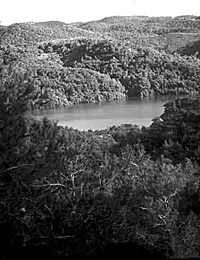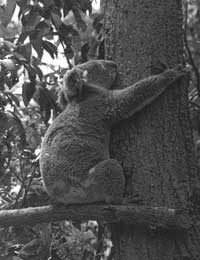
FAO/20565/M. MARZOT
United Nations Forum on Forests: first substantive session
The first substantive session of the United Nations Forum on Forests (UNFF) was held from 11 to 23 June 2001 at United Nations headquarters in New York. The major tasks on the agenda for UNFF-1 included:
In the opening session, Chair Mubarak Hussein Rahmtalla described UNFF as the most concrete institutional legacy of Agenda 21. Patricio Civili, Assistant Secretary-General of the United Nations Department of Economic and Social Affairs, summarized international forest-related activities since the 1992 United Nations Conference on Environment and Development (UNCED) and outlined the major lessons learned and the challenges that lay ahead. Hosny El-Lakany, CPF Chair and Assistant Director-General of the FAO Forestry Department, informed delegates about the establishment of the CPF, a small group of international organizations, institutions and instruments which will assist UNFF in its work. El-Lakany reported that following the adoption of the Multi-Year Programme of Work, the CPF would develop its work plan accordingly.
Opening remarks from delegates, in general:
The most contentious of the issues negotiated at UNFF-1 proved to be the Multi-Year Programme of Work. The final text includes sections on the structure of future UNFF sessions, monitoring, assessment and reporting, high-level segments, intersessional work by ad hoc expert groups and country-led initiatives, the involvement of major groups, enhancing cooperation and coordination and criteria to review the effectiveness of UNFF.
The final text of the Plan of Action includes sections on national-level activities, the activities of the CPF and its members, elements for implementation of the IPF/IFF proposals for action, financial resources and other means of implementation, targets and activities related to reporting and evaluation.
In the closing session, Saturday, 23 June, the draft decisions of the Multi-Year Programme of Work, the Plan of Action and the CPF were adopted by the plenary. The delegates also approved a statement on programme budget implications for the plan of work.
The second session of UNFF is scheduled for 4 to 15 March 2002 in San José, Costa Rica. It will include a high-level segment with ministers and executive heads of the CPF member organizations. It will also include a one-day multi-stakeholder dialogue which will provide a special opportunity for different forest-related stakeholders to provide inputs to the UNFF process. The thematic focus of UNFF-2 will be on combating deforestation and forest degradation; forest conservation and protection; and rehabilitation and conservation strategies for countries with low forest cover.
Sixteenth Commonwealth Forestry Conference
The sixteenth Commonwealth Forestry Conference was held from 18 to 25 April 2001 in Fremantle, Perth, Western Australia. Focused on the theme "Forests in a changing landscape", the conference was organized around four subthemes:
Allowing for the interpretation of "landscape" in all its connotations - physical, political, social and institutional - the theme provided scope for exploring a wide variety of experiences and perspectives from around the Commonwealth.
Participants included 407 delegates from 21 Commonwealth countries, together with representatives from Commonwealth agencies and a number from non-Commonwealth countries and international organizations. Delegates included 83 Australian students who benefited from the opportunity to interact with foresters from around the globe.
Participants were invited to participate in day tours and field trips to observe the role of plantations in reducing land degradation, the rapidly increasing pulpwood industry on private lands and native forest management including management for recreation and protection of wildlife. The final field trip, seen as an integral part of the conference, took participants into the heart of the Southwest Karri and Jarrah forests and then to see new plantations near Albany.
The conference was held jointly with the nineteenth biennial conference of the Institute of Foresters of Australia.
The Commonwealth is an association of 54 States accounting for 30 percent of the world's population. A common working language and similar systems of law, public administration and education facilitate the association's work to advance democracy, human rights and sustainable economic and social development within its member countries and beyond. The Commonwealth Forestry Conference has a long and successful history of bringing together forestry enthusiasts from across the Commonwealth to share their diverse experiences.
In a message read on his behalf at the opening day of the conference, Commonwealth Secretary-General Don McKinnon noted that the Commonwealth, with its broad international representation, is in a good position to address major global issues affecting forests, and will continue to play a key role in efforts to do so.
The next Commonwealth Forestry Conference will be held in Sri Lanka in 2005.

FAO FORESTRY DEPARTMENT/FO-0445/C. PALMBERG-LERCHE
ITTO governing body meets in Cameroon
The thirtieth session of the International Tropical Timber Council (ITTC) - the governing body of the International Tropical Timber Organization (ITTO) - and its associated committees was held in Yaoundé, Cameroon from 28 May to 2 June 2001. Representatives from most of the 56 ITTO member countries (30 producer members and 26 consumer members, including the European Union) attended, along with a number of observers from a variety of international, regional and local organizations.
Some of the main issues given attention at the meeting were: action to encourage progress on the ITTO Year 2000 Objective; timber certification; criteria and indicators; illegal logging and illegal trade in forest products; certification; ITTO input into the international dialogue; establishment of conservation areas; and reduced impact logging.
In the area of criteria and indicators, ITTO is continuing to place considerable emphasis on a variety of activities - including continuing to carry out ITTO training courses, developing reporting formats on the subject, and supporting an international conference on criteria and indicators to be organized with FAO.
ITTO is moving strongly into work on conservation areas and is giving emphasis to establishment of transboundary conservation sites. A project proposal from Cameroon to establish a gorilla sanctuary on the Cameroon-Gabon border was approved.
The role of ITTO in international and regional organizations and fora was discussed, with background provided by a report prepared by an Expert Panel. Representatives from a number of organizations presented summaries of links between their organizations and ITTO. During the session an agreement was signed to strengthen ties between ITTO and the African Timber Organization (ATO).
Illegal logging and illegal trade generated considerable debate and disagreement. Many developing countries expressed opposition to ITTO work in this area. It was therefore not possible to reach agreement on what ITTO's role should be. All that could finally be agreed was to have it placed on the agenda for the next ITTO meeting.
On certification, members were supportive of the work done under the seminar held in Rome in February by FAO, the German Agency for Technical Cooperation (GTZ) and ITTO on Building Confidence among Forest Certification Schemes and their Supporters. After much debate, a decision was passed authorizing ITTO to continue facilitating dialogue on certification by hosting a workshop on the subject in 2002. A proposal for ITTO to cooperate formally with the Forest Stewardship Council (FSC) drew widespread opposition and was eventually dropped.
A number of projects, pre-projects and activities were approved, and several were funded (including projects approved but not funded at previous meetings). Many of the projects funded were in the areas of reforestation and forest management. Despite the debate on the subject, the council agreed to finance a project to develop guidelines to stop illegal logging in Indonesia.
A full-day market discussion was held, at which numerous subjects were addressed under the theme "Regulations for a sustainable timber trade - relevant issues".
Documents of the session, including the ITTC decisions, and reports on ITTO projects and consultant reports can be found on the ITTO Web site (www.itto.or.jp/ittcdd_ses/thirtieth_sessions.html).
ITTTA celebrates 50 years
The International Technical Tropical Timber Association (ITTTA) turns 50 in 2001. To celebrate the occasion, the association will hold its biennial forum on 4 and 5 October 2001 at FAO headquarters in Rome.
The forum will be of interest not only to members, but to all people with activities or interests related to tropical forests. A variety of issues particularly regarding sustainable development - technological, economical, environmental and commercial - will be discussed and debated.
ITTTA is a non-political non-governmental organization with more than 200 members in some 33 tropical timber producing and consuming countries. It was created in 1951 at the request of FAO (which is represented in the association's Administrative Council) and the Organisation for Economic Co-operation and Development (OECD). Its members include:
The association's objectives are:
A detailed programme of the anniversary meeting will be available on the association's Web site: www.atibt.com/.